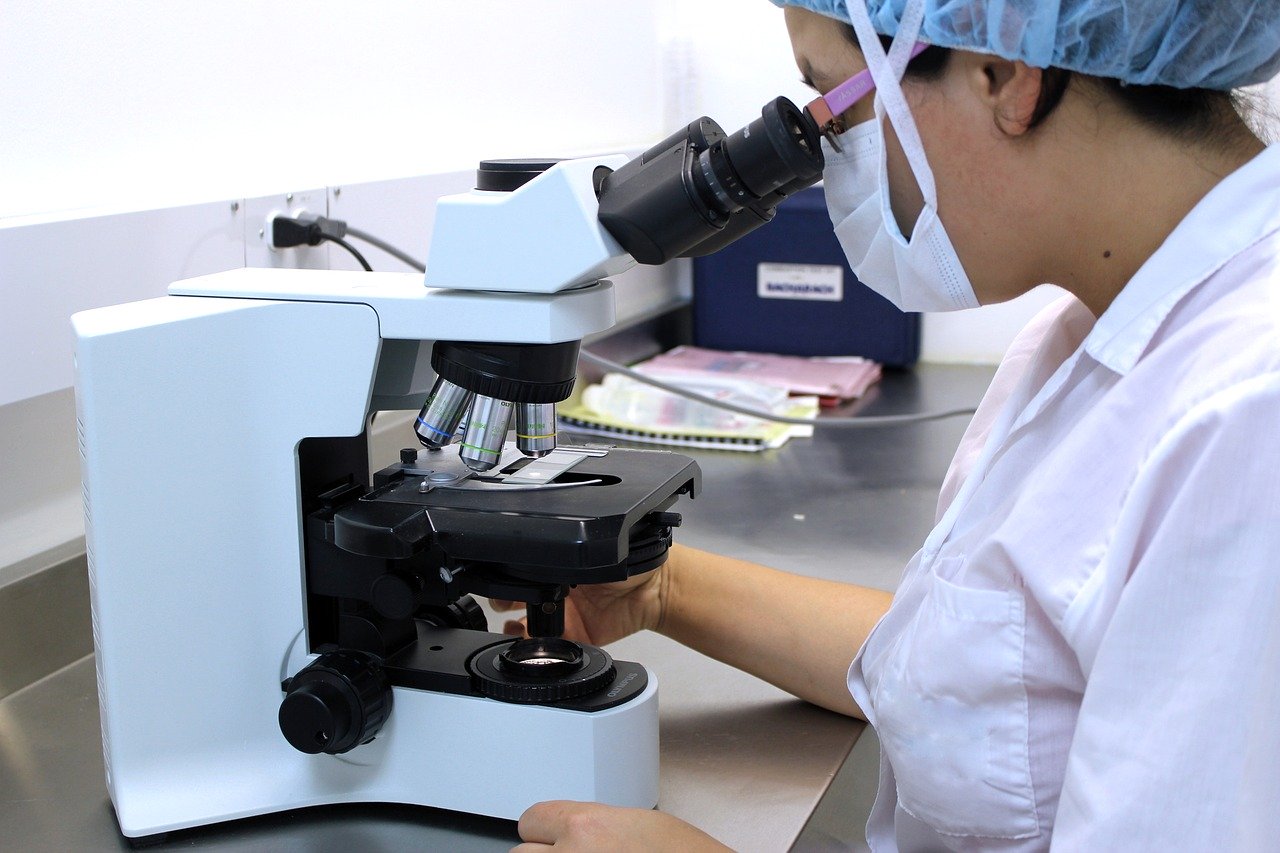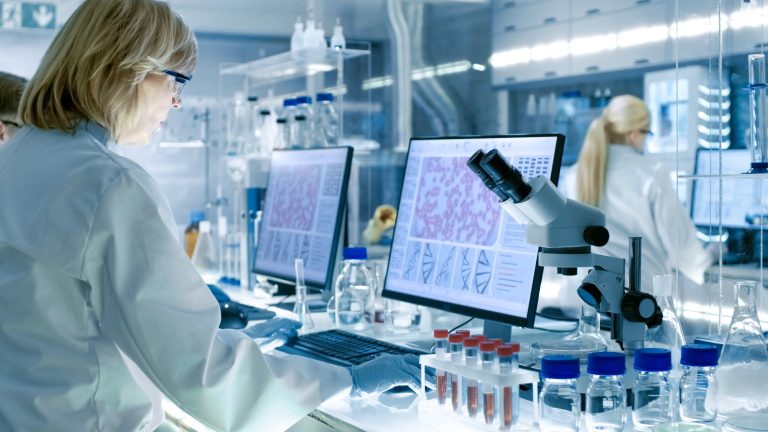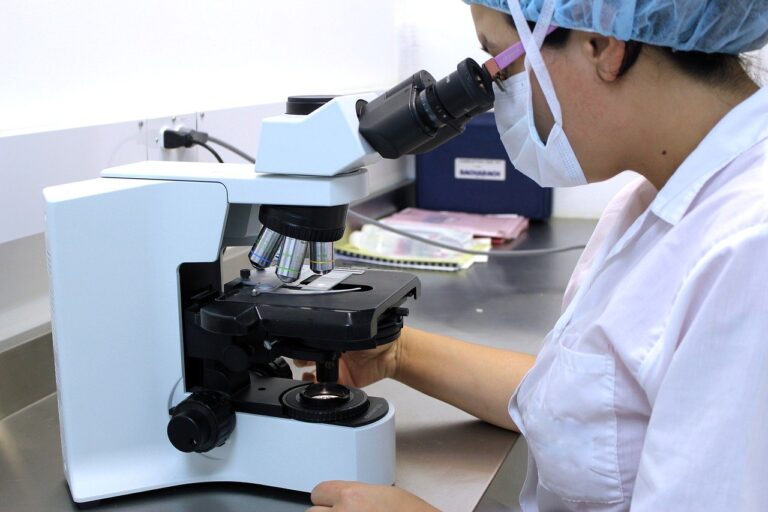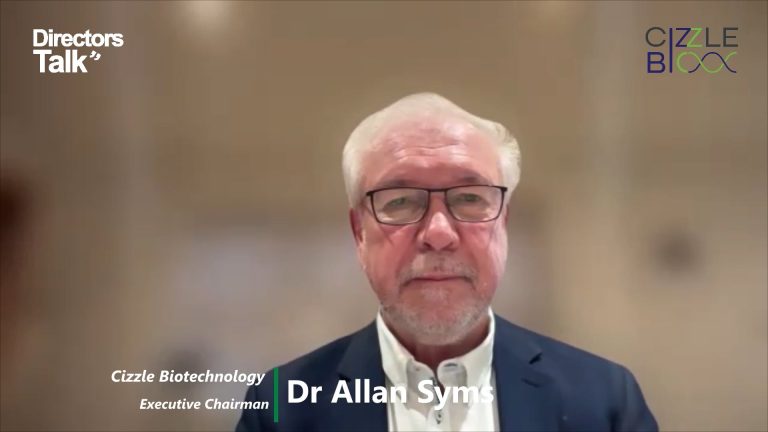Cizzle Biotechnology plc (LON:CIZ) Executive Chairman Dr Allan Syms caught up with DirectorsTalk for an exclusive interview to discuss the unique advantages of the CIZ1B biomarker, BIO’s partnership strategy, the Moffat Cancer Centre collaboration, strategy for the rest of the world, and what we can expect from the company over the next 6-12 months.
Q1: Allan, could you just remind us of the unique advantages of the CIZ1B biomarker that it offers in the detection of early stage lung cancer and how it compares to other diagnostic tools that are currently available on the market?
A1: The biggest problem of all is that lung cancer is the biggest killer of all globally and it’s very unfortunate that some 2.2 million people will lose their lives to this dreadful disease every year.
In part, the reason for that is there’s not a very effective early screening tool, a very good means to catch the disease when it’s at its earliest stage. Most of the people that die from that have got later stage diseases and so as a consequence what there is an unmet clinical need for something that can detect it very early.
If you think that only 17% of people will survive the five-year period once they’ve been diagnosed, and most of those are diagnosed at a later stage, our ambition as a company is to shift that dial from so many people dying to make it that 90% of the people survive. The best way of doing that, solving this problem, and that’s agreed by government, it’s agreed by UK Cancer Research, is detect early.
So, the goal is an early lung cancer detection test when we can do something about the disease early on, we can clinically resect the tumours and until recently there was no national screening programme here in the UK nor in the USA, but now there is.
That screening programme is based on low-dose CT scanning, which is great because we now have a means by which people can be targeted and asked to come to the clinic and be tested. The problem is that CT scanning generally creates a lot of false positives, and so a lot of people that perhaps don’t have cancer are being put into a category of saying well you might have cancer, and so that causes a lot of stress for people, and it causes a lot of use of resources and doctor’s time.
So, we’re really faced with the challenge of could we have something that is very effective, very cost-effective that is, and can detect cancer early and currently in the marketplace there are no simple blood tests to do this.
We’re knocking on the door of the absolute leading edge of how we can detect lung cancer early, and the company is at a pivotal stage in trying to achieve that.
Q2: Could you tell us more about BIO and the BIO partnership strategy to launch the CIZ1B biomarker test into North America?
A2: First, can I say I’m absolutely delighted that we’ve got this agreement signed. We’ve been working with the team in BIO for some time now, and really over the last few months in the final negotiations of the contract we were very clear about the goals and ambitions that both parties have. We’ve refined all of that so that we’ve actually got a very effective business model now to bring our test to North America.
The BIO team is fantastic from the viewpoint that they bring a whole new set of strengths to even our set of skills, which is they’re bringing clinicians and doctors to their advisory team. They are led by industry professionals that have served in the USA, know the USA market, know the C-suite level management teams of major hospital groups and doctors and clinicians, which is the group of people you need to have when you’ve moved from being a lab-based company into a commercial company, actually bringing the test to market. So, very seasoned veterans in the USA are heading up BIO, and they’ve already started work even ahead of signing our agreement because we had an MOU in place.
We’ve been working very hard with them as they start to build those relationships in North America. Their plans are at least initially to set up the, if you like, pathfinder labs for taking our test commercial. They are actually in discussions with multiple hospital groups across the USA.
We in the UK have been supporting them, working very hard because they’re generating such interest because, as I said earlier, the unmet clinical need means that there is a big demand for testing in the USA.
To give you some idea about how large that is, I mentioned earlier that there are now screening programmes in place based on low-dose CT scanning, and in the USA, there is a targeted group of patients of which is equal to 14.2 million people, which is a huge number of people. These are people of certain age that have been smokers during their life and they are targeted by the US Preventive Task Force to be screened.
The problem is only 6% of those targeted people are taking up the test and there are lots of studies about why that might not happen but part of it is because people don’t like to go to hospital, people are concerned about ongoing costs associated with any positive results they may get. So, there is a very large need just for the screening side of things.
BIO is very much targeting working with those centres, working with those major hospitals across the USA so hopefully we will see news soon of new studies beyond the one that we announced earlier this year with Moffat Cancer Centre. In addition to that, many new partnerships that they will make to actually supply our products into accredited laboratories.
So, this is the beginning of a stage that they’ve already been working very hard on. They’ve already secured funding that they need to do that, which means that from our perspective, that’s not funding we’ve gone to our shareholders for, and of course, really importantly, is that provides us our first major route to market.
Q3: You mentioned Moffat Cancer Centre, could you tell us about the strategic importance of the collaboration with them and how this partnership might accelerate market adoption of the test in the US?
A3: This is an absolute major step forward for us in being recognised by the number one cancer centre in Florida and Southeast America. This is a really highly expert group with a fantastic reputation across North America, they’re specialists in early lung cancer detection, and one of the problems that they are particularly interested in is not just the fact that we want to screen such a large number of people in the USA, but it’s for those people that present from a CT scan that have got a suspicious lung nodule.
CT scanning has improved over the years, but traditionally the problem with a CT scan that shows a nodule is you have to assume that that is a suspicious nodule that could be lung cancer, unfortunately, about 90% of the time, it’s not. So, that’s got big implications in terms of patient welfare, it’s got big implications in terms of cost and use of resources. Moffitt is very keen to have a blood test that goes alongside as a confirmatory test for any of the patients in their clinic that present with a suspicious lung nodule.
This is very important for us because now we’re using our test in anger, if you want, we’re now actually seeing patients in a clinic who have been identified with these lung nodules, who are going to be tested with our CIZ1B biomarker to see if they’re positive for the biomarker.
So this is a large study, it’s a study that will go over several years but it builds that relationship with one of the major cancer centres in the USA.
Of course, the credibility that comes with that is that they didn’t just select us because it was an off-the-shelf product, this took some discussions with them for them to look at our data, look at what our test was, and for them to believe that this is a valuable biomarker to add to their study. So, it’s a big endorsement of the company and its technology.
Q4: The deal with BIO obviously covers North America, but could you tell us about your strategy for the rest of the world?
A4: The company has a global licensing strategy, and the USA, of course, is one of the most important markets in the world so it’s important to get this one correct to begin with.
We are a fairly small company with limited resources in terms of sales and marketing. We’ve built our success on the work that’s been done at the University of York under the guidance of Professor Dawn Coverley, who obviously founded the company some years ago.
Our view was the most effective means to get this product to market is to work through partnerships and that since it costs money to enter a market, in the case of the USA, several millions of dollars just to get the thing moving. That, if we did it ourselves, would have to be borne by our shareholders, and then if you think about the global opportunity, you have to multiply that by many times. So, it’s very clear to us that the most cost effective means that the best way to get value back to our shareholders, the most rapid way in which we can get to revenue and become a revenue generating rather than a cash burning company, was through licensing partnerships.
The USA, as an example, gives us a 10% royalty on sales minus taxes, that is guaranteed to us in the US market. We’ve already received $400,000, we will get another $2 million over the next 30 months as guaranteed royalties as part of that relationship, plus, we will have an equity stake in their business. So, it’s a real partnership in the USA where we’re benefiting from guaranteed revenues, a success in terms of the growth of their business so it certainly motivates us to want to support them and make them very successful.
Therefore, if we can follow that model elsewhere in other key markets, that would be a means of multiplying the value of what we’ve got today and therefore making us, I think, a very attractive commercial business.
Now, there’s another layer to that commercial strategy, which is that, as we’ve said previously in announcements, we are developing a lab test currently to deliver the product. That means an accredited laboratory that will do the testing on a high throughput platform. However, we do have ambitions for making that test simpler and faster and more cost effective as we go forward, and ultimately, we want to see in the format of a point of care test, something that could be used in a doctor’s office or in a health clinic or in a pharmacy.
So, we will continue to build our product range and therefore, the type of licensing opportunity that we might do beyond North America might also be affected by the type of partner we choose, one that perhaps is not just lab-based, one that is perhaps more distribution based as a final product.
Just to be clear, our partnership in North America, we have an exclusive relationship with them on all product ranges, because we believe in their commercial management and their clinical management team can deliver all of that. We may not find that in every single market. So, the way in which we choose our partners will be selective but ultimately, what we’re seeking to do is to increase the revenue streams of the business whilst managing our shareholder funds efficiently.
Q5: Just to finish, Allan, could you summarise what we can expect to see from Cizzle Biotechnology and BIO over the next six months to a year?
A5: It’s a very exciting time for us. I’ve called it an inflection point for the company, because I really believe that it is, and we’re very much at the tip of an iceberg.
Given that we’ve got a 10% royalty, and $2 million of that is guaranteed, just gives you a sense of how big the market opportunity BIO sees it to be. In order for them to make that happen, they have to move very quickly, they have to get multiple sites up and running with the CIZ1B biotechnology, and I think they’ve already been doing that. To be fair, they’ve not waited until signing our agreement by getting out into the marketplace and talking to other major cancer centres.
So, the specifics that we might see is that Moffitt is fantastic, but there are other great centres across the USA, it’s a very large market so I expect that we will see further large trials being initiated with major hospital groups. We will see the first of our accredited laboratories go commercial with the test, we expect that to be happening so that revenues will be generating in those labs in 2025 so it’s fairly close, and we expect many of those labs to be accredited across the USA.
Just to give you a point of reference, there’s a fantastic patient advocacy group in the USA called Go2, and they are charged with the responsibility of doing this screening programme of 14.2 million Americans. That’s done through 880 centres of excellence so if we’re only touching one or two of those at the moment, then you can see the scope and the breadth and the size of the opportunity to go to those other centres and offering them a confirmatory blood test is enormous.
So, I think it’s going to be a very exciting next 6 to 12 months, and hopefully, as we secure those further partnerships in the USA with these large cancer centres and accredited laboratories, we’ll report that back to our shareholders.
So, really exciting news today, fantastic time for the business, and ultimately, and why we’re here is that we’re bringing our test finally to patients. We’re going to attack that problem of patients needlessly dying because there wasn’t an early lung cancer test.
Today, we are bringing that to the market and I’m very proud of the team here and really, really happy with our new relationship, I think it’s a great relationship we have in North America, can’t wait to get the sleeves rolled up and make this all happen.







































